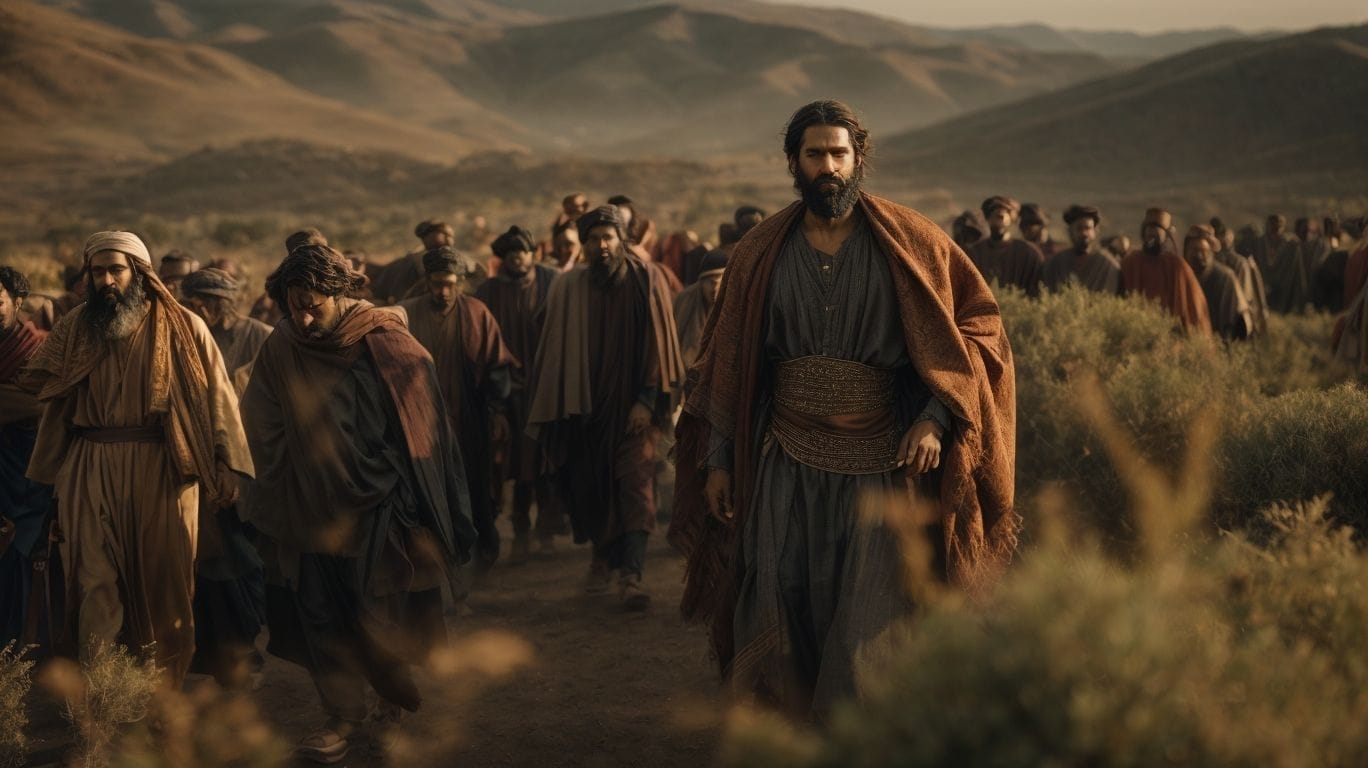Micah 6:6-8 is a passage from the Old Testament book of Micah in the Bible. It is a well-known and often-quoted verse that summarizes what God desires from his people. The passage urges the people of Israel to act justly, love mercy, and walk humbly with God. These words serve as a reminder of God’s expectations for his people and can offer guidance for all believers today.
Micah, whose name means “who is like God,” was a prophet from the tribe of Judah. He lived during the same time as the prophet Isaiah and was a contemporary of King Hezekiah. Micah’s ministry spanned from approximately 737-696 BC, and his message focused on calling the people of Israel to repentance and warning them of God’s judgment if they did not turn back to him.
The passage of Micah 6:6-8 comes at a time when the people of Israel were practicing outward religious rituals without truly understanding the heart of God’s law. They were offering sacrifices and following religious customs, but their hearts were far from God. Micah reminds them that the Lord does not desire sacrifices or offerings, but rather a heart that is aligned with his will.
The passage is situated in the midst of a larger discourse in which God is questioning his people’s faithfulness and reminding them of all the ways he has blessed them. In verses 6-8, God summarizes the essence of his law and the key elements of what it means to truly follow him.
The message of Micah 6:6-8 is timeless and applicable to all believers. It is a reminder to act justly, love mercy, and walk humbly with God. Doing justice means standing up for what is right and fair, especially for the marginalized and oppressed. Loving mercy involves showing compassion, forgiveness, and kindness to others, just as God has shown us. Walking humbly with God means recognizing our dependence on him and submitting to his will.
We can apply the principles of this passage in our daily lives by actively seeking opportunities to practice justice, showing mercy to those in need, and cultivating a humble and obedient relationship with God. We can also hold ourselves accountable to these standards and encourage others to do the same, fulfilling our role as ambassadors for God’s kingdom.
Key Takeaways:
What Is Micah 6:6-8?

Photo Credits: 777Legion.Com by Jeremy Flores
Micah 6:6-8 is a well-known passage from the Bible that provides guidance on how to lead a righteous life. It states, “He has shown you, O mortal, what is good. And what does the Lord require of you? To act justly and to love mercy and to walk humbly with your God.” This verse emphasizes the importance of treating others fairly, showing compassion, and maintaining a humble attitude. It serves as a reminder for believers to prioritize these virtues in their daily lives.
Fun fact: Micah 6:6-8 is considered one of the key verses in the book of Micah. To learn more about Micah 6:6-8, you can visit this reputable source.
What Is the Historical Context of Micah 6:6-8?

Photo Credits: 777Legion.Com by Matthew Lewis
The historical context of Micah 6:6-8 provides valuable insight into the prophet’s message to the Israelites during a time of moral and spiritual decline. This passage addresses the people’s misguided emphasis on ritual sacrifices instead of genuine acts of justice and mercy. Micah condemns their hypocrisy and urges a return to following God’s commandments. By understanding the historical backdrop, we can fully grasp the significance of Micah’s message and its relevance to the social and religious climate of that time period.
Who Was Micah?
Micah was a prophet who lived during the 8th century BCE in Judah. He was known as Micah of Moresheth as he hailed from the town of Moresheth. His name, meaning “Who is like Yahweh?”, reflected his strong messages of social justice and condemnation of corruption and injustice.
Micah prophesied during the reigns of Kings Jotham, Ahaz, and Hezekiah, witnessing the decline of Israel and the threat of Assyrian invasion. Micah’s words in Micah 6:6-8 emphasize the importance of doing justice, loving mercy, and walking humbly with God, principles that are still relevant today in promoting fairness, compassion, and a humble relationship with the Divine.
A true historical example of an individual who embodied Micah’s teachings is Nelson Mandela. Mandela fought against apartheid in South Africa, advocating for justice and equality. He demonstrated mercy by promoting forgiveness and reconciliation, even after being imprisoned for 27 years. Mandela’s humility was evident in his commitment to serving the people of South Africa, prioritizing their needs above his own. His life serves as an inspiring example of applying Micah’s teachings in the pursuit of a just and compassionate society.
What Was Happening During Micah’s Time?
Micah was a prophet who lived during a tumultuous time in Israel’s history. The nation was divided, and corruption and injustice were prevalent. The ruling class oppressed the poor, and idolatry was rampant. Micah spoke out against these injustices and called for repentance and restoration. He warned of the consequences of their actions and urged the people to return to God’s ways. Micah’s message resonates with us today, reminding us to stand against injustice, show compassion towards others, and humbly seek a close relationship with God.
What Is the Literary Context of Micah 6:6-8?

Photo Credits: 777Legion.Com by Gregory Adams
The literary context of Micah 6:6-8 can be understood by examining the preceding verses. In Micah 6:1-5, God presents a lawsuit against His people Israel, calling them to account for their disobedience and unfaithfulness. In verse 6, the people respond by asking what they can do to appease God. Micah 6:8, which is often quoted, provides the answer: “He has shown you, O mortal, what is good. And what does the Lord require of you? To act justly and to love mercy and to walk humbly with your God.” This verse emphasizes the importance of righteous conduct and a humble heart in the eyes of God.
What Is the Message of Micah 6:6-8?

Photo Credits: 777Legion.Com by Albert Smith
Micah 6:6-8 conveys a powerful message about God’s expectations for His people. The passage emphasizes that external rituals and sacrifices are not enough to please God; instead, He desires justice, kindness, and humility. The message of Micah 6:6-8 is that true worship involves living a life characterized by righteousness and compassion towards others. It challenges individuals to examine their actions and motivations, reminding them that their relationship with God is not solely based on religious observances, but on how they treat others and live out their faith.
What Does It Mean to Do Justice?
Doing justice means actively promoting fairness, equality, and righteousness in all aspects of life. In the context of Micah 6:6-8, doing justice involves acting in accordance with God’s moral standards and treating others with fairness and compassion. It means standing up for the oppressed, advocating for their rights, and working towards a more just society.
Doing justice requires recognizing and challenging systems of injustice, addressing societal inequalities, and promoting a culture of inclusivity and respect for all. The Civil Rights Movement in the United States was a powerful example of people coming together to fight for justice and equality for African Americans.
What Does It Mean to Love Mercy?
Loving mercy, as mentioned in Micah 6:8, means showing compassion, kindness, and forgiveness towards others. It involves having a heart that is inclined towards helping those in need and being willing to extend grace and understanding, even when it’s undeserved. Loving mercy goes beyond just acknowledging the suffering of others; it involves actively seeking opportunities to alleviate their pain and bring about restoration.
In our daily lives, we can demonstrate our love for mercy by practicing empathy, offering forgiveness, supporting charitable causes, and treating others with kindness and respect. By cultivating a heart of mercy, we can contribute to creating a more compassionate and just society.
What Does It Mean to Walk Humbly with God?
To walk humbly with God means to approach our relationship with Him with humility and reverence. It involves recognizing our limitations and acknowledging God’s sovereignty and wisdom. Walking humbly requires surrendering our own pride and desires, seeking guidance from God, and aligning our actions with His will. It also entails an attitude of submission and obedience, trusting that God knows what is best for us. By walking humbly with God, we acknowledge our dependence on Him, seek His guidance, and strive to live a life that reflects His character and values.
How Can We Apply Micah 6:6-8 in Our Lives Today?

Photo Credits: 777Legion.Com by Jeremy Carter
Micah 6:6-8 provides guidance on how we can apply its teachings in our lives today. Here are some steps to consider:
- Do justice: Act with fairness and integrity in our interactions with others.
- Love kindness: Show compassion, empathy, and generosity towards others.
- Walk humbly with God: Cultivate a deep relationship with God through prayer, worship, and a commitment to living according to His will.
How Can We Practice Justice in Our Daily Lives?
Incorporating justice into our daily lives involves being cognizant of societal issues and taking steps to promote fairness and equality. Here are some ways we can practice justice:
- Educate ourselves on social justice issues and understand their impact on marginalized communities.
- Speak up against discrimination and inequality when we encounter it.
- Support organizations and initiatives that strive for justice and equality.
- Advocate for policy changes that address systemic injustices.
- Volunteer our time and skills to aid those in need.
- Listen to and amplify the voices of marginalized individuals and communities.
- Examine our own biases and actively work to challenge and overcome them.
- Hold ourselves accountable for our actions and strive to be just and fair in our personal relationships and interactions.
How Can We Show Mercy to Others?
To demonstrate mercy towards others, we can take the following steps:
- Show compassion: Make an effort to understand the challenges and struggles of others, and respond with empathy and kindness.
- Forgive: Release grudges and resentments, offering forgiveness even in difficult situations.
- Offer assistance: Extend a helping hand to those in need, whether through acts of service, financial support, or emotional support.
- Practice patience: Be understanding and tolerant of others’ shortcomings and mistakes.
- Listen actively: Take the time to truly listen to others, validating their feelings and experiences.
- Practice non-judgment: Avoid passing harsh judgments and instead approach others with an open and accepting mindset.
How Can We Cultivate Humility in Our Relationship with God?
- Recognize our limitations and acknowledge that we are not all-knowing or all-powerful in our relationship with God.
- Practice gratitude and thankfulness for the blessings in our lives, recognizing that they come from a higher power and cultivating humility in our relationship with God.
- Seek wisdom and guidance from spiritual teachings and scriptures, understanding that we do not have all the answers and humbly approaching our relationship with God.
- Embrace humility in our interactions with others, treating them with respect and kindness as we strive to cultivate humility in our relationship with God.
- Engage in self-reflection and self-awareness, recognizing our own flaws and areas for growth as we seek to cultivate humility in our relationship with God.
- Develop a sense of awe and reverence for the divine, acknowledging our place in the grand scheme of things and humbling ourselves before God.
- Let go of our ego and pride, surrendering ourselves to a higher power and recognizing that we are not in control of everything in our relationship with God.
- Strive for humility in our thoughts, words, and actions, always seeking to serve others and put their needs before our own as we cultivate humility in our relationship with God.


